Successful and clever parties use any new channel for spreading their message. Singapore’s People’s Action Party (PAP) is one of the most successful political parties in the region and always open to new ways of connecting with the voters. With a new Prime Minister and elections round the corner, recruiting INFLUENCERS from outside the party ranks looks like a clever move.
Tag Archives: party politics in Southeast Asia
Is Party Hopping a Breach of Faith?
“Whenever a legislator elected on a party ticket or as an independent changes his party affiliation or joins a party, he commits a breach of faith. In most elections, party identity has more influence on the minds of the electorate than the personal prestige of the candidate. In fairness to the electorate, a defector should be made to seek a fresh mandate from the people.”
Kamath, P. M. (1985) “Politics of Defection in India in the 1980s,” Asian Survey, Vol. 25, No. 10, (October), 1039-1054.
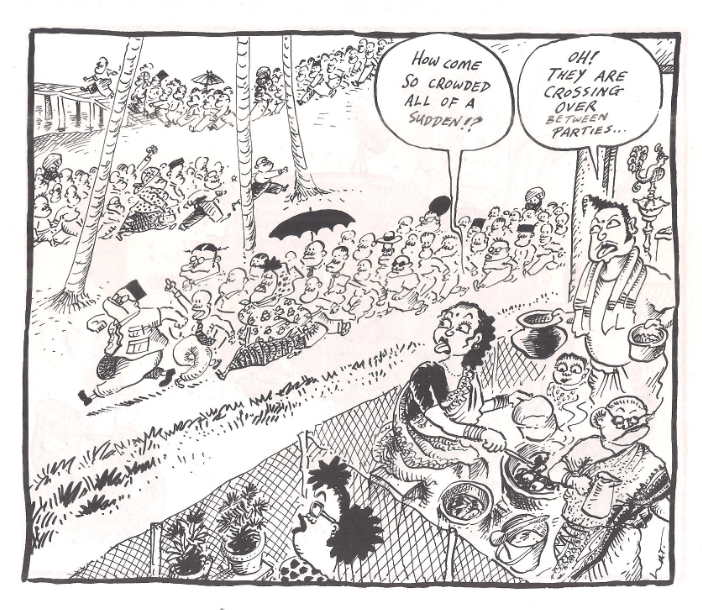
Cartoon by Lat, Malaysia, 1980s
What Prof Kamath, a political scientist at the University of Mumbai, called a breach of faith, carries many negative names on the side of the “giving” or “losing” party, something between defection and treason or more. The “receiving” party, of course, sees it in a positive light, and may call it a courageous move, a plunge of belief, a trusting jump, or a decision of conscience. The single party hopper, though, as warmly as he or she may be welcomed in the new party will never be fully trusted. Converts are often more eagerly faithful than the other group members, and that is not too welcome as well.
Since party hopping has been widespread in Southeast Asia, regulated in some countries and often being discussed for tougher regulation in others, we don’t want to discuss the pros and cons here in detail.
For a good introduction into the party hopping topic, we recommend the analysis by Kenneth Janda, Northwest University, Illinois. The paper is from 2009 and offers a good comparative overview. For Southeast Asia, a couple of updates are necessary.
Link: wp0209 (leidenuniv.nl)
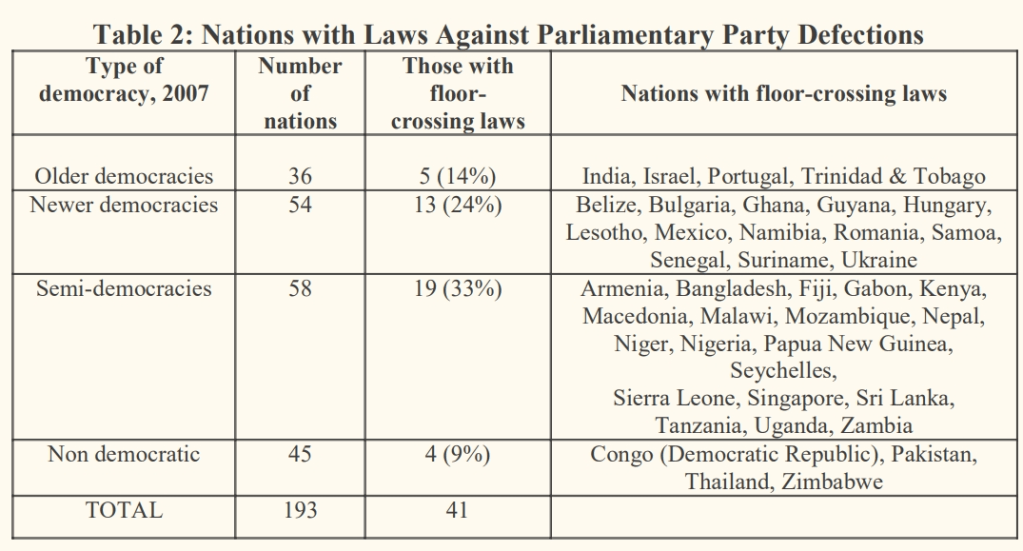
For a better understanding of politics in the region, the second sentence in the quotation above is at least similarly important, maybe even more:
“In most elections, party identity has more influence on the minds of the electorate than the personal prestige of the candidate.”
Partyforumseasia thinks that this is debatable and will continue to look into the issue. Contributions are welcome.
Umno’s No-Contest Motion
The Trappings of Leadership Succession in Malaysia
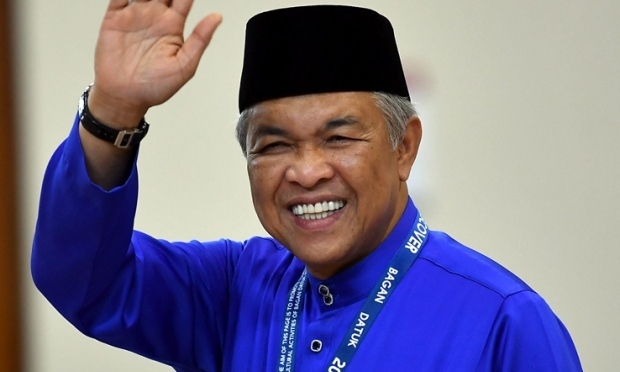
Partyforumseasia: Malaysia’s United Malays National Organisation (UMNO), the party which dominated the country’s politics for six decades, is trying to digest and hopes to overcome its worst election result ever. With the reliable support of ethnic minority parties, the predominantly Malay UMNO used to enjoy stable absolute majorities. After several years of gradual decline, the shock result of the November 2022 election reduced it to only 30 seats in the 222-member parliament.
Like in any political party, victories have many fathers and unite the membership whereas losses trigger internal and public debates, rivalries flare up and the hunt for culprits is difficult to control. This was the central problem of party president Dr Ahmad Zahid Hamidi and secretary-general Ahmad Maslan, the second in command. The calls for their resignation were loud enough, especially from the former MPs who lost their mandate, but as well from the members who blame the defeat as a deserved punishment for the years of money politics and corruption. With former UMNO leader and Prime Minister Najib Razak in prison and a conviction of Zahid looming, many were arguing for a self-cleansing exercise to improve the bad image of the party. Acquitted of 40 corruption charges in September last year, Zahid is still facing 47 charges of criminal breach of trust, corruption, and money laundering. In most democratic systems this would have finished his leadership ambitions, not so in UMNO and not in Malaysia. With admittedly skillful arguments and maneuvers, Zahid has managed to survive. He persuaded the recent general assembly of the party (January 11-14) to vote with a convincing majority of delegates not to contest the two top posts in the coming party polls, which must be held by May 19.
The main argument tried to persuade the delegates that shaking the boat even further would be a deadly danger for the very survival of the party, especially in view of the growth of long-time rival PAS, the Islamist party competing in UMNO’s Malay vote bank. Zahid’s and Maslan’s success shows as well how skillful the two can play the party piano, even without the deep pockets the party used to enjoy, mainly from contributions by Government-linked companies (GLCs).
The outmaneuvered faction in the assembly was not only against Zahid and Maslan and a more forceful renewal, but also for a rejuvenation of the leadership. Zahid, who just turned 70 last week, has been challenged by Khairy Jamaluddin, 47, a former leader of UMNO’s Youth Wing, former Minister of Youth and Sports as well as Health Minister. As son of a top diplomat and son in law of a former Prime Minister, he belongs to Malaysia’s “political nobility”, but above all he is a political animal of sorts. He lost his seat in Parliament in November and will have enough time to campaign for a continuation of his political career. One possible opportunity will come if Zahid should be convicted and imprisoned at the end of the law suit which will resume in April. For many it looks logical that his fight for an acquittal would be supported if he remains party president and Deputy Prime Minister in the present Government under PM Anwar Ibrahim.
For students of party politics, the ongoing saga is a rather interesting case study, though, or maybe even more so, because it is not following the textbooks on liberal democracy. But which party does?
Multi-Party-Systems and Too-Many-Party-Systems
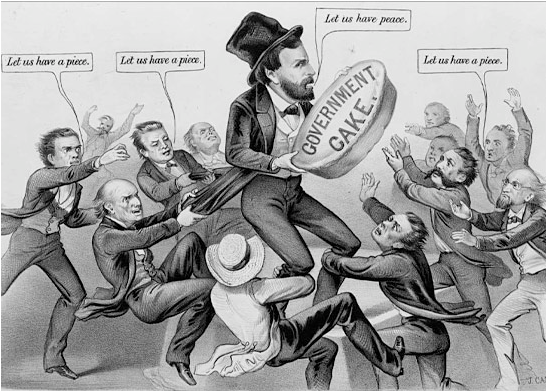
Theorising about party systems has kept generations of political scientists busy, and – no surprise – there is still no clear winning theory which system is best. The scholarly debates are influencing the even greater number of journalists and political commentators who try to explain what happens within the governments, coalitions, and political parties. As good and bad examples of political practice develop and erode constantly, the paradigms for theories change as well. The dramatic fallout of the Trump presidency created headlines like “The two-party system is killing our democracy” in the USA, or the increasing fragmentation of the Western European party systems yielded skeptical assessments like “A kaleidoscope of novel political coalitions are taking shape around Europe as old two-party systems crumble.”
Southeast Asia is saddled with a wild mix of most of these problems and more. Two recent developments are worth a debate on the party systems in the region. One is due to the lowering of the voting age from 21 to 18 in Malaysia, effective since 15 December last year, where four new parties are eying a share of up to 5.8 million first-time voters with many of them supposed to be fed up with the performance and the politicking style of the old parties. While political leaders who have dominated the scene for decades, like Anwar Ibrahim, Mahathir Mohamad, Najib Razak, and Lim Kit Siang are slowly fading out of the picture, the bet on younger voters looks reasonable enough. Political Party Forum has already introduced the Parti Kuasa Rakyat, helmed by Mr Kamaruzaman Yaakob, the elder brother of Prime Minister Ismail Sabri Yaakob. The second new party is the youth-based Malaysian United Democratic Alliance (Muda), registered by former Cabinet minister Syed Saddiq Abdul Rahman. In addition, the multiracial Parti Bangsa Malaysia (PBM) has been set up by two MPs along with a former aide to current federal minister Zuraida Kamaruddin. Parti Warisan Sabah, which previously led the Sabah state government in east Malaysia for two years, has announced that it is expanding to Peninsular Malaysia.
See details in Singapore’s Straits Times HERE
Another case in point is the addition of a new party to the already rather diversified party scene in Thailand by former finance minister Uttama Savanayana. The name and leadership of the party have not yet been revealed but according to Mr. Uttama the registration should be finalized before the end of this month.
For details see the Bangkok Post HERE
Malaysia and Thailand have multi-party systems and changing coalitions among them which are equally confusing for the citizens and observers from outside. Both countries are probably candidates for something like a “Too-many-parties-system”.
The ruling coalition in Kuala Lumpur consists of a leading “sub-coalition”, called Perikatan Nasional or National Alliance, encompassing already five single parties, namely the Malaysian United Indigenous Party (BERSATU), Pan-Malaysian Islamic Party (PAS), Homeland Solidarity Party (STAR Sabah), Sabah Progressive Party (SAPP) and Parti Gerakan Rakyat Malaysia (GERAKAN). A second “sub-coalition”, Barisan Nasional, consists of the former ruling party UMNO plus its long-term partners Malaysian Chinese Association (MCA), the Malaysian Indian Congress (MIC), and the United Sabah People’s Party (PBRS), plus the Gabungan Parti Sarawak (GPS), the Parti Bangsa Malaysia (PBM), and the Parti Bersatu Sabah (PBS) as appendix members. With twelve member parties this can be called a world class coalition, only topped in countries like the Democratic Republic of Congo, Mali, and Iraq.
In Thailand, the situation is similar, with the ruling coalition consisting of the following 18 parties: Palang Pracharath, Democrat Party, Bhumjaithai, Chartthaipattana, Action Coalition for Thailand, Chart Pattana, Thai Local Power, Thai Forest Conservation, Thai Nation Power Party, People’s Progressive Party, Thai Civilized Party, Palang Thai Rak Thai Party, Teachers’ for People Party, Prachaniyom Party, Thai People Justice Party, Thai Citizens Power Party, New Democracy Party, New Palangdharma Party.
Coalitions with so many parties are the result of a splintered party landscape and many of the smaller or regional parties contributing only a few elected MPs or only one. They also reveal that the ruling coalition is close to a very slim majority in Parliament and needs every MP to pass its legislation. As in many other and much smaller coalitions worldwide as well, it is difficult to define any ideological cohesion except the determination to govern. What Paul Taylor called “Europe’s Odd Couple Politics”, also known as “strange bedfellows coalitions”, is rather common in Southeast Asia. It does not necessarily delegitimize the democratic system as such but confusing as it is for the voters, it does not strengthen the democracy either. And when it is, as unfortunately rather widespread in the region, saddled with money politics and visible corruption, skepticism and low voter turnout don’t come as a surprise. If politicians, especially former top office holders, are being seen as just fighting to make it back to the spoils of power, they cannot fool the people that they are dying to serve them.
Ninety-six Percent! Dream Results in Vietnam’s Parliamentary Election
Partyforumseasia: The election was on 22 May but given remaining logistical problems in rural areas and some other incidents, the National Election Council (NEC) announced the final results only on Thursday, 9 June.
 Political parties world wide can only dream of winning 96 percent of the seats, but most of them have a big handicap, they have to compete with other parties. Vietnam’s Communist Party has no party competitors in the single party system, but this year independents and activists have tried to make inroads into parliament in bigger numbers than ever before. True to Vladimir Ilyich Lenin‘s advice “trust is
Political parties world wide can only dream of winning 96 percent of the seats, but most of them have a big handicap, they have to compete with other parties. Vietnam’s Communist Party has no party competitors in the single party system, but this year independents and activists have tried to make inroads into parliament in bigger numbers than ever before. True to Vladimir Ilyich Lenin‘s advice “trust is 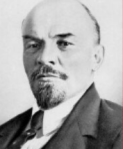 good control is better”, the authorities have painstakingly screened the 100 odd independent candidates. According to the constitution, every citizen of Vietnam over 21 has the right to run, but the umbrella organization of all Vietnamese mass organizations, the Vietnam Fatherland Front (VFF) has a mandate to screen all candidates, whether fielded by the Communist Party, other mass organizations or self-nominated. In the 2015 Law on the Vietnam Fatherland Front Article 19 stipulates: “The Vietnam Fatherland Front shall organize in accordance with law consultations, selection and nomination of candidates for deputies to the National Assembly or People’s Councils;…” With the authorities already alarmed before the nomination deadline on March 13, the VFF has done the required job by eliminating all but 11 self-nominated candidates for the National Assembly, two of them being finally elected. Since the vetting process is not transparent, the rejected candidates and their supporters are not happy. A prominent victim of the screening, the “five gates”, was pop star Mai Khoi, also called Vietnam’s Lady Gaga. For her campaign posters she had dressed down considerably, showing herself as a serious conservative candidate, which was obviously not enough to make her trustworthy.
good control is better”, the authorities have painstakingly screened the 100 odd independent candidates. According to the constitution, every citizen of Vietnam over 21 has the right to run, but the umbrella organization of all Vietnamese mass organizations, the Vietnam Fatherland Front (VFF) has a mandate to screen all candidates, whether fielded by the Communist Party, other mass organizations or self-nominated. In the 2015 Law on the Vietnam Fatherland Front Article 19 stipulates: “The Vietnam Fatherland Front shall organize in accordance with law consultations, selection and nomination of candidates for deputies to the National Assembly or People’s Councils;…” With the authorities already alarmed before the nomination deadline on March 13, the VFF has done the required job by eliminating all but 11 self-nominated candidates for the National Assembly, two of them being finally elected. Since the vetting process is not transparent, the rejected candidates and their supporters are not happy. A prominent victim of the screening, the “five gates”, was pop star Mai Khoi, also called Vietnam’s Lady Gaga. For her campaign posters she had dressed down considerably, showing herself as a serious conservative candidate, which was obviously not enough to make her trustworthy.


Only two elected self-nominated candidates, one of them a businessman from the North, and a hematologist, means 50 % less than in the last election, when four had made it. Another 19 non-party members have been nominated by state institutions, down from 42 non party members altogether last time.
Among the other results, published so far, are:
– An enormous voter turnout of 99.35 %
– National Assembly: 496 members (317 first-timers) elected out of 870 candidates Four seats remain vacant because of insufficient turnout in four provinces. Maybe the same shortcoming has been reported in Singapore’s Straits Times (Link): “Deputy assembly chairman Phung Quoc Hien said the high national turnout showed the ballot was a success, even with some instances of fraud and calls on social media for a voter boycott.” Oh-oh!
– To be elected were also 3,918 provincial councilors, 24,993 district councilors and 294,055 commune councilors for the 2016-2021 period. The official announcements so far focus on the National Assembly. It is not excluded that the local results are not everywhere as expected…
– The chairperson of the NEC acknowledges that “There were some errors on voting cards that led to invalid votes and forced a re-election in some cases. There were also some cases of negligence when it came to controlling the number of ballots issued and the number received. Many constituencies didn’t elect enough representatives, especially at communal level, and some people voted on others’ behalf” (VNExpress, June 8)
– 62.5 % of elected delegates have a master’s degree or higher; 36.3 a bachelor’s degree; and 1.2 percent, or six delegates, don’t have a degree at all. The party does not mention workers and farmers any more.
– 133 delegates are women, 26.8 % and slightly short of the 30 % target
– Vietnam’s ethnic minorities hold 17.3 % of the seats
– 182 candidates (36.7 percent of total NA delegates) have been nominated centrally, 312 delegates were nominated by local organizations
But nearly half of the centrally nominated candidates in Ho Chi Minh City have not been elected and about a third in Hanoi, with a few more in smaller places, altogether 15. The alleged national unity seems to have some risky corners.
– All top leaders were re-elected, General Secretary Nguyen Phu Trong with 86.47 %; President Tran Dai Quang with 75.08 % ; Prime Minister Nguyen Xuan Phuc with 99.48 %; and NA Chairwoman Nguyen Thi Kim Ngan with 91.46 %
The lowest score went to the minister for Natural Resources and Environment, probably because of the dead fish crisis, but his 65 % would still be a dream result in more competitive systems
Open Questions to follow up:
Behind the official fanfares about the feast of democracy in Vietnam it will be interesting to wait for more information about the provinces with insufficient turnout and the four vacant seats. But even more interesting will be detailed results of the Peoples’ Councils elections on all levels from province down to the municipalities. Communication and social networks won’t make it easier for the party to control nearly 100 m Vietnamese.
Party Competition Cambodian Style – No Impunity At The End?
Partyforumseasia: In February we had last commented on the ongoing brutality against opposition members in Cambodia’s Parliament. While CNRP leader Sam Rainsy is in exile again and a well orchestrated campaign is trying to destroy his deputy Kem Sokha over an alleged extramarital affair, there is a not really expected follow-up to the brutal beatings of CNRP members in front of parliament.
The thugs were masked and escaped easily under the eyes of police deployed in front of the Parliament building. It all looked like the usual impunity for many dubious happenings under supervision and responsibility of the ruling party and its government. The traditionally rather indulgent international observers and embassies in Phnom Penh are getting more vocal with their protest, but with traditionally little results on the Cambodian side.
But, surprise, surprise, now the authorities have identified and indicted some of the thugs who beat up the unprotected parliamentarians:
 Under the headline “Of 16 who assaulted MPs, only three, all Bodyguard Unit members, face trial” the Phnom Penh Post (Link) gives the latest details. The three accused are all “members of Prime Minister Hun Sen’s personal Bodyguard Unit – while additional evidence suggests further involvement by the elite unit.”
Under the headline “Of 16 who assaulted MPs, only three, all Bodyguard Unit members, face trial” the Phnom Penh Post (Link) gives the latest details. The three accused are all “members of Prime Minister Hun Sen’s personal Bodyguard Unit – while additional evidence suggests further involvement by the elite unit.”
At least three (scapegoats?) indicted, but the whole scheme highlighted. That is not party competition but partisan warfare. Political hardball is quite common in Southeast Asia, but even a lot harder in Cambodia. Let’s wait for the justice system for results and final assessment.
The Split of Parti Islam Se-Malysia (PAS)
Partyforumseasia: Founded in November 1951, PAS was itself splitting from the United Malay National Organization UMNO, but allowed dual membership in the beginning. It championed Malay and Muslim rights and the recognition of Islam as state religion which was somewhat contradicting the founding principle of Malaysia as a multi-ethnic and multi-religious country with full citizenship for the massive Chinese and Indian immigration under the British colonial rule. The contradiction has festered until today and generated a party system along racial lines with UMNO and PAS competing for the Malay Muslim vote, especially in the more conservative rural areas.
The opposition coalition Pakatan Rakyat or People’s Alliance consisting of Anwar Ibrahim‘s racially open Parti Keadilan Rakyat (PKR), PAS and the Chinese dominated DAP seemed to blur the ideological divisions until PAS president Abdul Hadi‘s push to introduce Hudud (Muslim penal code regulations) in Kelantan exposed the internal fault lines in PAS and triggered the break-up of the Pakatan Rakyat.
But not all PAS members are following the hard-line Muslim clerics under Hadi Awang, the so called “ulama” faction. A minority formed the “Erdogan” faction, when the Turkish president was still considered a moderate Muslim leader, but lost all leadership posts in internal party elections earlier this year.
Splitting from PAS in big numbers now, the moderates have founded a new party under the name of “Parti Amanah Negara” (in short “Amanah” = trust or fulfilling one’s obligations in Arabic). 
The new party’s president Mohamad Sabu aka Mat Sabu was a deputy president of PAS since 2011 and moderate challenger of the clerical hardliners. In a statement during the launching of the party he said the new political platform is committed to continue the legacy of political Islam, but realizing that Malaysia is a country of people from diverse social and religious backgrounds, Amanah interprets Islam in a more holistic and inclusive manner. In an era of increasing Arab influence in the country a shift to moderate and more open alternatives should be welcome.
Amanah was officially launched on 17 September with thousands of supporters attending and claiming that more than 30,000 members are already joining, including non-Muslims and over a hundred lawyers.
With DAP veteran Lim Kit Siang also attending the meeting it is clear that the new party is most welcome to replace PAS in the opposition coalition. Amanah, though, states its openness to co-operate with PAS, but president Hadi Awang as leader of the hardliners has immediately excluded any truce with the “traitors”. Nevertheless, discussions on the rejuvenation of the opposition coalition as “Pakatan Rakyat 2.0” are underway with PKR and DAP, because without the massive remaining membership potential of the old PAS there is no chance of ousting UMNO and its coalition partners from their entrenched power position, despite the extreme pressure on prime minister and UMNO-leader Najib Razak with the embarrassing 1MDB financial scandal.
If the break-up of the opposition looked like a timely relief and victory for the government, it is matched by the slow erosion of the UMNO-led Barisan Nasional by the marginalization of smaller component parties which were kept alive by massive financial support from UMNO anyway.
Malaysia needs urgently strong and united leadership to get out of the crisis. Unfortunately, the ruling and government coalitions look equally weakened.
For a better understanding of party politics in Malaysia see Kartini Aboo Talib‘s country paper (available at Amazon) in:

Radical Buddhism Meddling in Myanmar’s Politics
Partyforumseasia: The international headlines focus predominantly on radical Islam, sometimes on radical Hinduism in India, from time to time on Christian fundamentalism in the US. Buddhism, all in all, has managed to keep an image of peacefulness, except in Myanmar, where Buddhist monks took part in violent attacks on the Muslim Rohingya minority. Since mid 2013 they are organized in the “Association for the Protection of Race and Religion”, also known under the acronym Ma Ba Tha or “မဘသ” in Burmese.
 The organization is being described as nationalistic, fiercely anti-Islam, and well connected to the military. Though article Article 364 of the Constitution prohibits the “abuse of religion for political purposes”, Ma Ba Tha leaders are openly supporting the ruling Union Solidarity and Development Party (USDP). During its second anniversary conference in June, Bhaddamta Vimala, a senior monk and secretary of Ma Ba Tha, criticized the opposition as too inexperienced to rule the country and urged the monks to drum up support for the USDP in the upcoming elections on 8 November. Monks cannot vote but their influence among the population is considerable.
The organization is being described as nationalistic, fiercely anti-Islam, and well connected to the military. Though article Article 364 of the Constitution prohibits the “abuse of religion for political purposes”, Ma Ba Tha leaders are openly supporting the ruling Union Solidarity and Development Party (USDP). During its second anniversary conference in June, Bhaddamta Vimala, a senior monk and secretary of Ma Ba Tha, criticized the opposition as too inexperienced to rule the country and urged the monks to drum up support for the USDP in the upcoming elections on 8 November. Monks cannot vote but their influence among the population is considerable.
After independence the U Nu government tried to introduce Buddhism as the state religion, but the law was never passed after resistance in the multi-ethnic and multi-religious country. Nevertheless, Ma Ba Tha has celebrated “state religion day” on 30 August to commemorate the 1961 move toward Buddhism as official religion. The day’s religious importance derives from Buddha teaching the Metta Sutta, or discourse on loving kindness which seems to be rather irreconcilable with the militant and violent sides of Ma Ba Tha.
The organization was also more than supportive in legislation concerning religious conversions and interfaith marriages as well as compulsory monogamy and population-control – it actually drafted them. The last of the four laws was signed by president Thein Sein on 31 August, the whole package being criticized by the NLD and Aung San Suu Kyi as discriminatory for the minorities. But this may backfire in the elections, because Ma Ba Tha has grown into a very powerful nationalistic force which will certainly use its considerable influence to support the USDP and reduce the chances of the NLD.
Nota bene: Christian groups in the West should not cry foul too easily. The Christian Democratic parties in Europe have enjoyed the churches’ support for many years, and American Evangelicals still wield considerable influence until today.
Multiparty Systems and the Upcoming Election in Myanmar
Partyforumseasia: The much anticipated parliamentary election in Myanmar in November will probably be contested by around 70 political parties. 73 are already registered as eligible, 14 applications are still pending with the Union Election Commission (UEC). Out of the 73 registered so far, 53 will run nationwide and 20 only regionally. And among the 73 there are 43 ethnic based parties which reflects the complicated multi-ethnic structure of the country.  The many decades long civil wars in too many areas will make the voting process difficult if not impossible in some. But generally, the progress in regulating the election law and its supervision is being seen as positive by parties and external observers. Diversity and insufficient infrastructure will make the election a rather difficult task for everybody, and some flaws remain in details like enormous discrepancies in the size of constituencies and precincts (between hundreds of thousands and as few as 1400) which opens the doors to manipulations by the parties which can afford it.
The many decades long civil wars in too many areas will make the voting process difficult if not impossible in some. But generally, the progress in regulating the election law and its supervision is being seen as positive by parties and external observers. Diversity and insufficient infrastructure will make the election a rather difficult task for everybody, and some flaws remain in details like enormous discrepancies in the size of constituencies and precincts (between hundreds of thousands and as few as 1400) which opens the doors to manipulations by the parties which can afford it.
The number of parties, a bit frightening at first glance, may be one of the easier parts of the exercise. First of all, it is much lower than the 235 registered parties in the 1990 election which was won by Aung San Suu Kyi’s NLD but not accepted by the military. Secondly, the ethnic fragmentation of the country is certainly not easy to be overcome by any single party, though many pundits predict that the NLD may win a two-thirds-majority. And finally, Myanmar is in maybe not good but numerous company with its “Multitude-Party-System“:
The parliamentary election tomorrow in Britain, the mother of the two-party-system which worked for nearly a hundred years with the first-past-the-post election system, is being contested by only seven main parties (but seven already), and additionally a multitude of smaller ones as well. The UK has 428 registered parties and Northern Ireland another 36. There are about 800 candidates from minor parties and independents. In other European countries the party systems are similarly expanding or disintegrating, Germany had 34 parties in the 2013 election, etc.
Indonesia, to have a regional comparison, had an inflation of parties after the fall of Suharto. But the country managed to reduce the number of parties admitted to run in 2014 from 46 registered to finally 12 parties qualifying.
There are many reasons to establish a political party. From obvious material interests like state subsidies in many European countries or the license of publishing a profitable newspaper in Egypt to the personal ambition of born or self-declared leaders any combination is possible. Political participation is desirable in terms of democratic principles, but the competition must be regulated in order to make the system governable. Myanmar has progressed in that direction, many say that the November election will be the best in 50 years, so the international community and the Asian neighbors can only wish the country the deserved success.
________________________________________________
More information:
The International Crisis Group offers an excellent and downloadable background paper “Myanmar’s Electoral Landscape“, Asia Report No 266, 28 April 2015 (Link here)
For the evolution of Myanmar’s political system see: Moe Thuzar and Zaw Oo in Sachsenröder, Wolfgang (ed), Party Politics in Southeast Asia, Organization – Money – Influence, 2014, ISNB 1493587145 or ISBN-13: 9781493587148, available at Amazon, Barnes&Noble and other online distributors.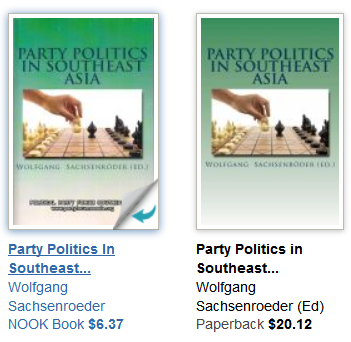
From MMM to MMP: Thailand Changing The Electoral System
Partyforumseasia: Changing the electoral boundaries (gerrymandering) is the most common and most unnoticed manipulation of election systems, whereas the impact of tweaks and changes in the electoral system may be the most controversially discussed in political science. But even when the outcome for a certain party is difficult to predict, the committees changing the system have effects and outcomes on their minds.
The Bangkok Pundit, Jan 16, 2015 (Link) gives an interesting introduction of what is in the pipeline:
“The CDC (=Constitutional Drafting Committee) is proposing a Mixed-Member Proportional (MMP) electoral system, modeled after the system in Germany. Like Thailand’s previous Mixed-Member Majoritarian (MMM) electoral system MMP gives voters two votes: one for a constituency MP in a single seat electoral constituency, and one for a party list. However, rather than simply adding the party list seats to a party’s constituency seat total, as is done under MMM, the party list vote is used to determine the total number of seats a party receives. The goal of MMP is to make the number of seats each party obtains as proportional as possible to the percentage of party list votes the party receives.”
“The total number of seats in the House of Representatives will be a minimum of 450 and a maximum of 480 seats, at least 20 fewer seats than the previous parliament. The number of constituency seats has been dramatically reduced, from 375 in the 2011 elections to a proposed 250, with about 250,000 people per MP. The number of seats set aside for the party list increases from 125 to 200. At 44 percent of total seats this represents the largest percentage of seats set-aside for the party list since Thailand adopted a two-tier system 2001. Finally, as in 2007 the party list seats are to be divided across 8 electoral regions.”
Testing the difference between MMM and MMP on the 2007 and 2011 elections, the analysis shows that the new system will be an advantage for the Democrat Party. The impeachment process against former PM Yingluck Shinawatra and her forseeible banning from the political scene show anyway the general intention of the changes: Keeping the Shinawatras and the Puea Thai party out.
Vietnam’s Communist Party and the Media
Partyforumseasia: In authoritarian systems people are used to read between the lines, ignoring more or less the propaganda packaging of the news. The attached recent article from Vietnam News allows a glimpse into a way of informing the public which looks touchingly old fashioned in the age of internet and social media. The powerful secretary general of the all powerful single party has a nice discussion with a group of undefined voters informing them about the good progress in the work of party and government.
But the list of shortcomings in this report is long and comprehensive. The voters are concerned about corruption, low quality and hazardous fake products, the high public debt, slow law enforcement, public service (or probably bureaucracy) reduction and the organization of the People’s Council. Rectifying all these is really a tall order for government and party, but at least the voters know that they are working on it. And “Ho Chi Minh’s moral example” will help.
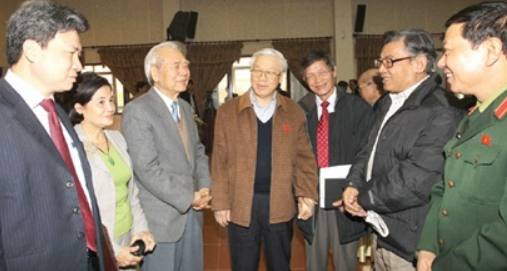 Secretary General Nguyễn Phú Trọng in the middle
Secretary General Nguyễn Phú Trọng in the middle
Party leader meets Ha Noi voters.
Vietnam News 8.12.2014 Link here:
Party General Secretary Nguyen Phu Trong met with voters in Ha Noi’s Ba Dinh, Hoan Kiem and Tay Ho districts on Saturday to inform them of the outcomes of the National Assembly’s eighth session and listen to their opinions. Most voters praised the outcomes of the session, especially the vote of confidence and responses cabinet members gave during question-and-answer sessions. Many voiced concerns about issues related to corruption and low-quality and fake commodities that seriously affected people’s health. Regarding foreign investment attraction, they emphasised the need to carefully consider socio-economic and defence interests, ensuring that investment did not affect national security. Voters also worried about high public debts and Government bond debts, slow enforcement of laws, and emerging problems in education and training. Acknowledging voters’ opinions, the Party chief said that during the NA’s eighth session, 30 laws were debated, 18 laws were passed and many important resolutions were approved. Deputies passed a resolution to conduct a vote of confidence on officials holding positions elected or approved by the NA and People’s Councils, he said. He also agreed with voters on the need to promote the role and responsibilities of deputies to ensure the quality and efficiency of the NA.
Regarding anti-corruption efforts, Trong said the Party was determined to fight corruption and wastefulness without compromise while maintaining political stability. In the coming time, the Party would continue speeding up implementation of the Party Central Committee’s resolution on party building as well as the Politburo’s resolution on studying and following President Ho Chi Minh’s moral example, he said. Regarding the East Sea issue, General Secretary Trong underscored that a series of measures had been rolled out to protect national independence and sovereignty while maintaining an environment of peace and stability for development and friendship with other countries, and not allowing external forces to cause disturbances. “We are determined to follow a foreign policy of peace, independence, self-reliance and friendship with all countries,” he said. He also mentioned a number of issues raised by voters, including public servant reduction, wage reform, the organisation of the People’s Council and ensuring law enforcement. Trong said he hoped to hear more from voters to help the Party and National Assembly improve their performance. (…)”
 Nguyễn Phú Trọng (born 14 April 1944) is the General Secretary of the Communist Party of Vietnam, elected at the party’s 11th National Congress on 19 January 2011.Trong heads the party’s Secretariat, as well as the Central Military Commission,the country’s two most powerful policy making bodies. (Wikipedia)
Nguyễn Phú Trọng (born 14 April 1944) is the General Secretary of the Communist Party of Vietnam, elected at the party’s 11th National Congress on 19 January 2011.Trong heads the party’s Secretariat, as well as the Central Military Commission,the country’s two most powerful policy making bodies. (Wikipedia)
For more information see: Le, Kim: The Communist Party of Vietnam: A Party in  Transition. In: Wolfgang Sachsenröder (ed.), Party Politics in Southeast Asia, Singapore 2014, pp. 346-410 (available at Amazon, Barnes & Noble and other internet bookstores)
Transition. In: Wolfgang Sachsenröder (ed.), Party Politics in Southeast Asia, Singapore 2014, pp. 346-410 (available at Amazon, Barnes & Noble and other internet bookstores)
Singapore: The PAP in the Next 50 Years??
Partyforumseasia: “It is very hard to predict, especially the future” is a Danish saying or a quotation of Danish scientist Niels Bohr. Extrapolating political trends or the fate of a political party like Singapore’s People’s Action Party (PAP) over half a century seems to be somewhat daring, even if the party is already in power for 56 years. 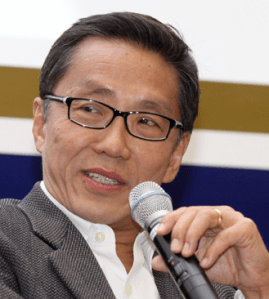 The daring speaker in a recent event of the Institute of Policy Studies (IPS) was Ho Kwon Ping, one of Singapore’s most prominent businessmen (The Banyan Tree chain of luxury resorts among other ventures) with a string of important director- and chairmanships under his belt. Ho was suspected of communist ideas in his younger days, even imprisoned in Singapore under the Internal Security Act for two months.His wife, who has been a nominated member of parliament, described him as “a capitalist in his pocket and a socialist in his heart.”
The daring speaker in a recent event of the Institute of Policy Studies (IPS) was Ho Kwon Ping, one of Singapore’s most prominent businessmen (The Banyan Tree chain of luxury resorts among other ventures) with a string of important director- and chairmanships under his belt. Ho was suspected of communist ideas in his younger days, even imprisoned in Singapore under the Internal Security Act for two months.His wife, who has been a nominated member of parliament, described him as “a capitalist in his pocket and a socialist in his heart.”
The three possible scenarios described by Ho Kwon Ping are as follows: 1. Status quo, the PAP retains its 85 to 90 % of seats in parliament. 2. PAP loses some support but retains a two-thirds or at least absolute majority. 3. An opposition party or coalition wins power and takes over the government.
The third scenario could happen in the second half of the next 50 years says Ho. Given the success of continuous PAP rule, that is cautious enough a guess, especially in view of the imbalance between the ruling PAP and the few relevant opposition parties. There are sizable amounts of protest votes in Singapore and undercurrents of disagreement with government and PAP, the social media showing the extent of dissent.
The main opposition Workers’ Party managed to win a group representation constituency with six mandates in the 2011 election and a seventh seat in a by-election in 2013. All the other parties are far from a realistic chance to make it into parliament because of internal problems, lack of funds and organization or credibility.
Mr. Ho’s presentation and the the public debate triggered by it may also be interpreted as a start to the election campaign 2016. There is no doubt that the PAP is determined to win again and continue to rule Singapore.
The underlying reasons and mechanism of the hegemonic imbalance have been analyzed in detail by Prof. Netina Tan: Institutional Sources of Hegemonic Party Stability in Singapore. This country chapter on Singapore is available in our book “Party Politics in Southeast Asia – Organization Money Influence” (2014) at the following links: Amazon or Barnes and Noble and other internet book retailers.
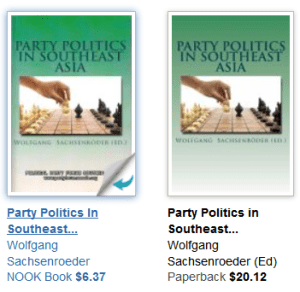
Gerrymandering in Malaysia…and Elsewhere
Partyforumseasia: In its August 9th -15th 2014 issue, The Economist, a British weekly, is taking up the gerrymandering issue which a majority of Malaysian voters may have forgotten already after the last election in May 2013. That is the normal all over the world because manipulation of the electoral boundaries happens outside media attention and looks nearly legally correct.  The ruling Barisan Nasional won 60% of the seats with only 47% of the vote, whereas the Pakatan Rakyat opposition coalition garnered 51% of the popular vote but was left with only 40% of the seats in Parliament. Malaysia, as a former British colony, adopted the British first-past-the-post electoral system which is designed to create strong majorities, irrespective of the distribution of the popular vote. To make the system even more “efficient”, the commissions in charge of delineating the constituency boundaries may carve them in a partisan way if they are close to one of the competing parties or coalitions. This is called gerrymandering and started in 1812, when the governor Elbridge Garry of Masschusetts created an electoral district which looked like a salamander on the map and was clearly favorable for his Democratic Republican Party. Until today, according to the ACE Project or Electoral Knowledge Network (aceproject.org), the USA is still at the extreme end of the spectrum between independent and partisan election commissions: “At one end of the spectrum is the United States, where the redistricting process is very political and decentralised. The responsibility for drawing districts for the United States Congress rests individually with the fifty states. There are few limitations on the states, and the boundary authorities are almost always political entities, i.e., state legislatures.
The ruling Barisan Nasional won 60% of the seats with only 47% of the vote, whereas the Pakatan Rakyat opposition coalition garnered 51% of the popular vote but was left with only 40% of the seats in Parliament. Malaysia, as a former British colony, adopted the British first-past-the-post electoral system which is designed to create strong majorities, irrespective of the distribution of the popular vote. To make the system even more “efficient”, the commissions in charge of delineating the constituency boundaries may carve them in a partisan way if they are close to one of the competing parties or coalitions. This is called gerrymandering and started in 1812, when the governor Elbridge Garry of Masschusetts created an electoral district which looked like a salamander on the map and was clearly favorable for his Democratic Republican Party. Until today, according to the ACE Project or Electoral Knowledge Network (aceproject.org), the USA is still at the extreme end of the spectrum between independent and partisan election commissions: “At one end of the spectrum is the United States, where the redistricting process is very political and decentralised. The responsibility for drawing districts for the United States Congress rests individually with the fifty states. There are few limitations on the states, and the boundary authorities are almost always political entities, i.e., state legislatures.
At the other end of the spectrum are many of the Commonwealth countries, where politicians have opted out of the redistricting process and granted the authority to redistrict to neutral or independent commissions.”  Link here
Link here
Britain has done and is doing a lot to adjust the electoral boundaries to the demographic changes and create fair chances for the competing parties. The average number of voters per district is around 75,000 with few exceptions like East Ham (London) at 91,531 and Orkney and Shetland at 33,755 (2010).
The crux in Malaysia is that a defined maximum variation (normally 10-15%) has been taken out of the constitution and that it can reach several hundred percent. Sure, the rural constituencies in Sabah and Sarawk are difficult to administer, but Indonesia is geographically even more difficult and has managed the parliamentary and presidential elections this year much better.The Malaysian Election Commission is handpicked by the government anyway, but it does not look good that its former chairman has joined the Barisan National’s right-wing support group Perkasa.
Gender Inequality in Politics: More Funding = More Women MPs?
Partyforumseasia: Globally, female representation in Parliaments stands at 21.9 percent, and at 19.0 percent in Asia, according to the Inter-Parliamentary Union (www.ipu.org/wmn-e/world.htm). In a new white paper the International Foundation for Electoral Systems (IFES) is looking into the common problem “that women wanting to run for office have less access to resources than men”. The excellent research can be downloaded for free at the IFES website with the following Link: Political Finance and Gender Equality
 The paper is very specific on electoral systems and financial regulations and their impact on campaign funding for women in a general perspective. The two concrete country studies, Tunisia and Yemen look less relevant for Southeast Asia at first glance, but provide a lot of insight nevertheless. Especially the Tunisian example shows that societies with a big gender gap in terms of political participation can improve rather fast if the political will is there. The white paper’s comparison of the MENA (Middle East North Africa) countries is interesting and cries for a similar study on Southeast Asia:
The paper is very specific on electoral systems and financial regulations and their impact on campaign funding for women in a general perspective. The two concrete country studies, Tunisia and Yemen look less relevant for Southeast Asia at first glance, but provide a lot of insight nevertheless. Especially the Tunisian example shows that societies with a big gender gap in terms of political participation can improve rather fast if the political will is there. The white paper’s comparison of the MENA (Middle East North Africa) countries is interesting and cries for a similar study on Southeast Asia:
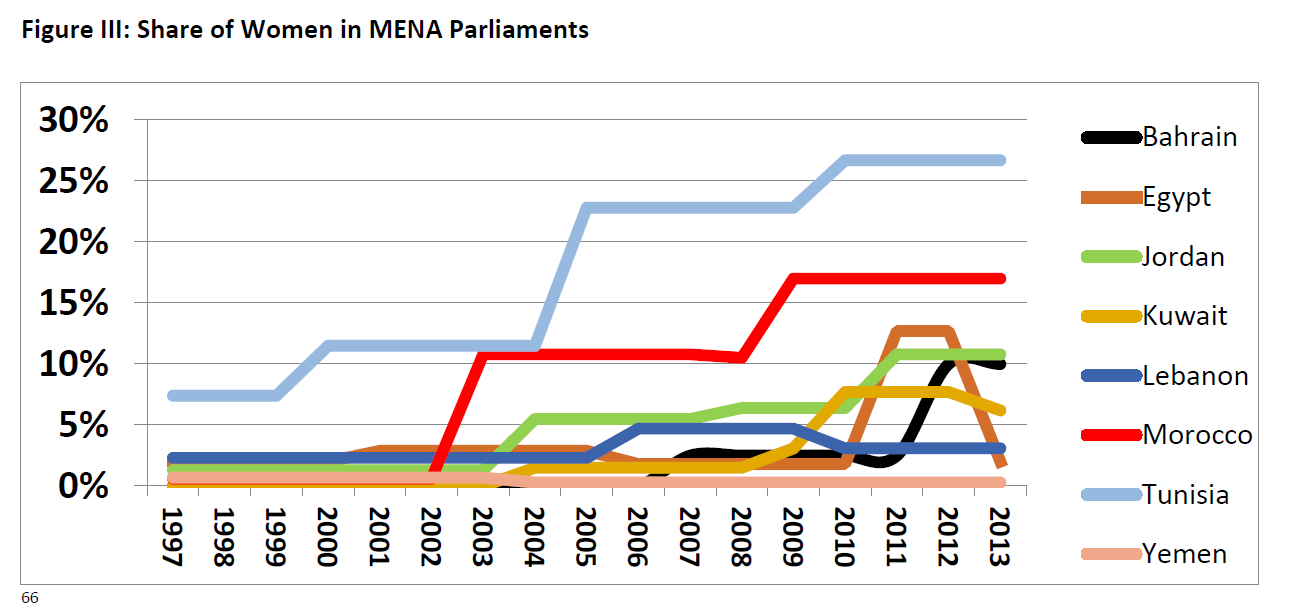
PS: Partyforumseasia’s book “Party Politics in Southeast Asia – Organization – Money – Influence” available at Amazon (link) is paying special attention to the gender attitudes in the parties.

